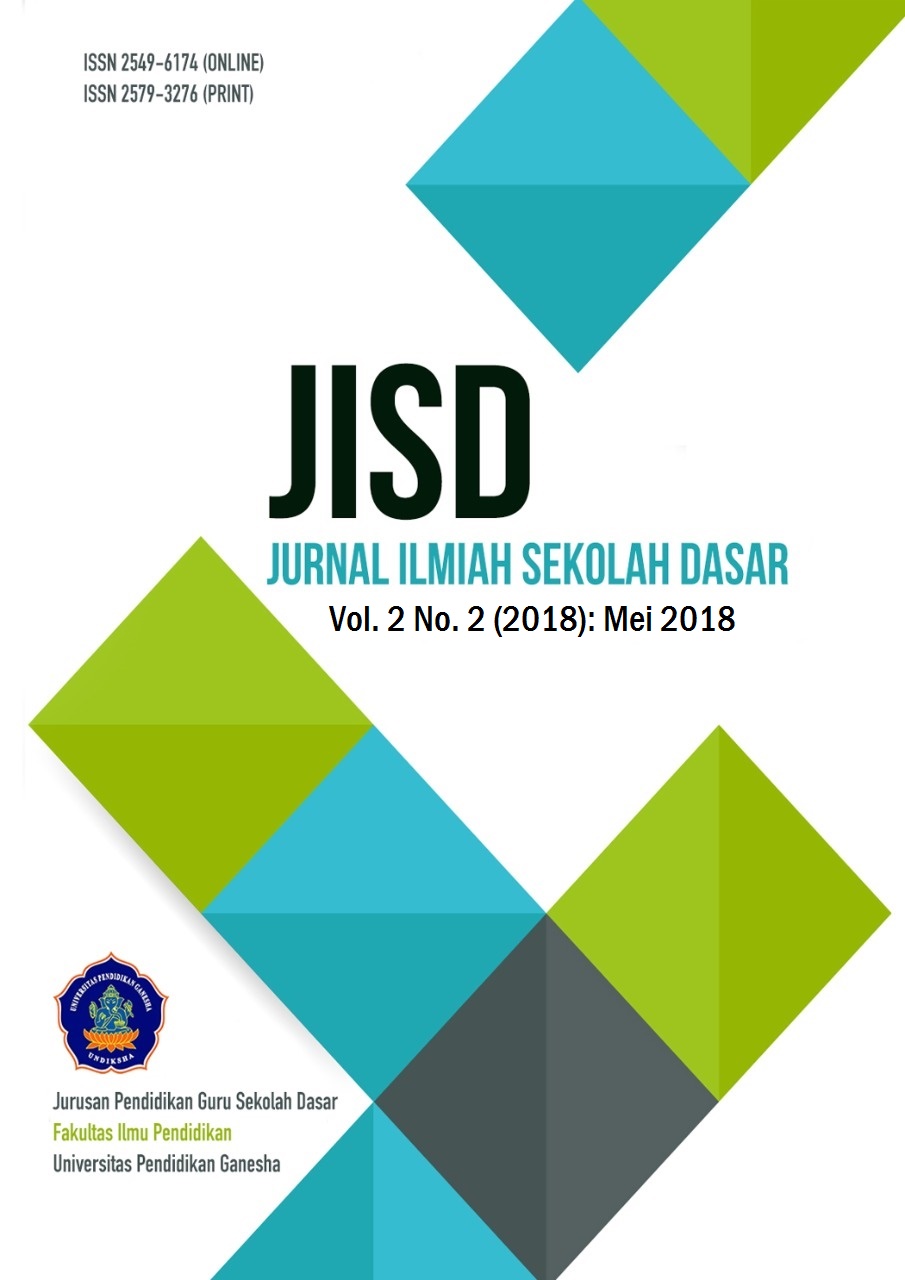Pengaruh Model Pembelajaran Kooperatif Tipe Student Teams Achievment Division Terhadap Penguasaan Kompetensi Pengetahuan IPS
DOI:
https://doi.org/10.23887/jisd.v2i2.15490Abstract
This study aims to determine the differences of cooperative learning model of Student Teams Achievment Division (STAD) type and conventional learning on the competence of IPS knowledge of fourth grade students of SD Negeri Gugus Pattimura of the academic year 2016/2017 on the theme of Kayanya Negeriku. This study is an experimental study to compare IPS knowledge competence which is taught by cooperative learning model of STAD type and students who are taught by conventional learning using scientific approach. The research design used is a quasi-experimental design with noquivalent control group design. The population in the study were all fourth grade students of SD Negeri Gugus Pattimura. Sampling technique using randoms sampling then conducted equality test on the sample. Then proceed with a prerequisite test that obtains the result that the sample group is normally distributed and has a homogeneous variance. After the prerequisite test, the hypothesis test is done with the criterion tcount ≤ ttable at 5% significance level and dk = 38 + 40 - 2 = 76 is 2.00. Based on result of hypothesis test obtained tcount = 2,64, then result of tcount compared with ttable that get result tcount > ttable. The conclusion of this research is that there is a significant difference in the mastery of IPS knowledge competence of the group of students who are taught using STAD type cooperative learning model and the group of students who are taught using conventional learning.
References
Bhoke, Wilibaldus. 2016. “Pengaruh Model Pembelajaran Kooperatif Tipe Student Teams Achievemment Division (STAD) dan Motivasi Belajar terhadap Hasil Belajar Matematika Siswa Kelas V SD Gugus 2 Kecamatan Bajawa Kabupaten Ngada- Flores”, Volume 3, ISSN: 2355-5106 (hlm 106).
Giantara, I Made. 2014. “Pengaruh Penerapan Model Pembelajaran Kooperatif Tipe STAD terhadap Hasil Belajar Matematika Siswa Kelas V SD Gugus V Kecamatan Marga”, Vol 2 (pg 04).
Gunawan, Rudy. 2016. Pendidikan IPS : Filosofi, Konsep, dan Aplikasi. Bandung: Alfabeta.
Kosasih, E..2016. Strategi Belajar dan Pembelajaran. Implementasi Kurikulum 2013. Bandung: Yrama Media.
Lasia, I Nyoman. 2014. “Penerapan Pendekatan Kooperatif Tipe Stad Untuk Meningkatkan Keaktifan Dan Hasil Belajar Siswa Dalam Mata Pelajran Ips Di Kelas Iii Sd Negeri 12 Padang Sambian Kota Denpasar Tahun 2013/2014”, Vol 2 No 1.
Majid, Abdul. 2015. Strategi Pembelajaran. Bandung: Remaja Rosdakarya.
Malik, Oemar. 2012. Kurikulum dan Pembelajaran. Jakarta: Bumi Aksara.
Permendikbud. 2014. “Peraturan Menteri Pendidikan Dan Kebudayaan Republik Indonesia Nomor 57 Tahun 2014 Tentang Kurikulum 2013 Sekolah Dasar/Madrasah Ibtidaiyah Lampiran III” Jakarta: Kemendikbud
Permendikbud. 2014. “Peraturan Menteri Pendidikan Dan Kebudayaan Republik Indonesia Nomor 103 Tahun 2014 Tentang Pembelajaran Pada Pendidikan Dasar Dan Pendidikan Menengah”. Jakarta: Kemendikbud
Permendikbud. 2014. “Peraturan Menteri Pendidikan Dan Kebudayaan Republik Indonesia Nomor 104 Tahun 2014 Tentang Penilaian Hasil Belajar Oleh Pendidik Pada Pendidikan Dasar Dan Pendidikan Menengah”. Jakarta: Kemendikbud
Permendikbud. 2016. “Peraturan Menteri Pendidikan Dan Kebudayaan Republik Indonesia Nomor 20 Tahun 2016 Tentang Standar Kompetensi Lulusan Pendidikan Dasar dan Pendidikan Menengah”. Jakarta: Kemendikbud
Rusman. 2014. Model-Model Pembelajaran : Mengembangkan Profesionalisme Guru. Jakarta: Rajawali Pers.
Slavin, Robert E.2016.Cooperative Learning Teori, Riset dan Praktik.Terjemahan Narulita Yusron.Cooperative Learning: theory, research and practice. 2005.Bandung:Nusa Media.
Sudiarpa, Komang, 2015. “Pengaruh Model Pembelajaran Kooperatif Tipe STAD terhadap Hasil Belajar IPA di SD No. 3 Songan”, Volume 3 (pg 01).
Sudiarsini, Made, 2016. “Pengaruh Model Pembelajaran Kooperatif Tipe STAD Berbantuan Media Visual terhadap Hasil Belajar IPA Kelas V SD”, Vol 4 (pg 01).
Sumantri, Mohamad Syarif. 2015. Strategi Pembelajaran : Teori dan Praktik di Tingkat PendidikanDasar. Jakarta: Rajawali Pers.
Susanto, Ahmad. 2014. Pengembangan Pembelajaran IPS di Sekolah Dasar. Jakarta: Kencana.
Susanto, Ahmad. 2015. Teori Belajar dan Pembelajaran di Sekolah Dasar. Jakarta: Kencana.
Solihatin, Etin dan Raharjo. 2012. Cooperative Learning : Analisis Model Pembelajaran IPS. Jakarta: Bumi Aksara
Undang-undang Republik Indonesia No. 20 Tahun 2003 tentang Sistem Pendidikan Nasional. 2003. Jakarta: Sekretaris Negara Republik Indonesia.
Utami, Santi. 2015. “ Peningkatan Hasil Belajar Melalui Pembelajaran Kooperatif Tipe Stad Pada Pembelajaran Dasar Sinyal Video”, Vol : 22, No. 20. Tersedia pada https://journal.uny.ac.id/index.php/jptk/article/view/7840/6712
Wahyuni, Ni Kd. Ratna. 2014. “Pengaruh Model Pembelajaran Kooperatfatif Tipe STAD berbasis interaksi sosial terhadap Hasil Belajar IPS Siswa Kelas V SD”, Vol : 2 (pg 01)
Wulandari,Putu Yuni. 2014. “Pengaruh Penerapan Model Pembelajaran Kooperatif Tipe Team Accelerated Instruction (Tai) Terhadap Hasil Belajar IPS Siswa Kelas V SD Gugus VIII Kedewatan Kecamatan Ubud Gianyar”, Vol : 2 No 1.
Yensy, Nurul Astuty. 2012. “Penerapan Model Pembelajaran Kooperatif Tipe Examples Non Examples Dengan Menggunakan Alat Peraga Untuk Meningkatkan Hasil Belajar Siswa Di Kelas Viii Smp N 1 Argamakmur”, Vol : 10 . No 1.
Downloads
Published
How to Cite
Issue
Section
License
Authors who publish with the Journal Ilmiah Sekolah Dasar agree to the following terms:
- Authors retain copyright and grant the journal the right of first publication with the work simultaneously licensed under a Creative Commons Attribution License (CC BY-SA 4.0) that allows others to share the work with an acknowledgment of the work's authorship and initial publication in this journal.
- Authors are able to enter into separate, additional contractual arrangements for the non-exclusive distribution of the journal's published version of the work (e.g., post it to an institutional repository or publish it in a book), with an acknowledgment of its initial publication in this journal.
- Authors are permitted and encouraged to post their work online (e.g., in institutional repositories or on their website) prior to and during the submission process, as it can lead to productive exchanges, as well as earlier and greater citation of published work. (See The Effect of Open Access)










